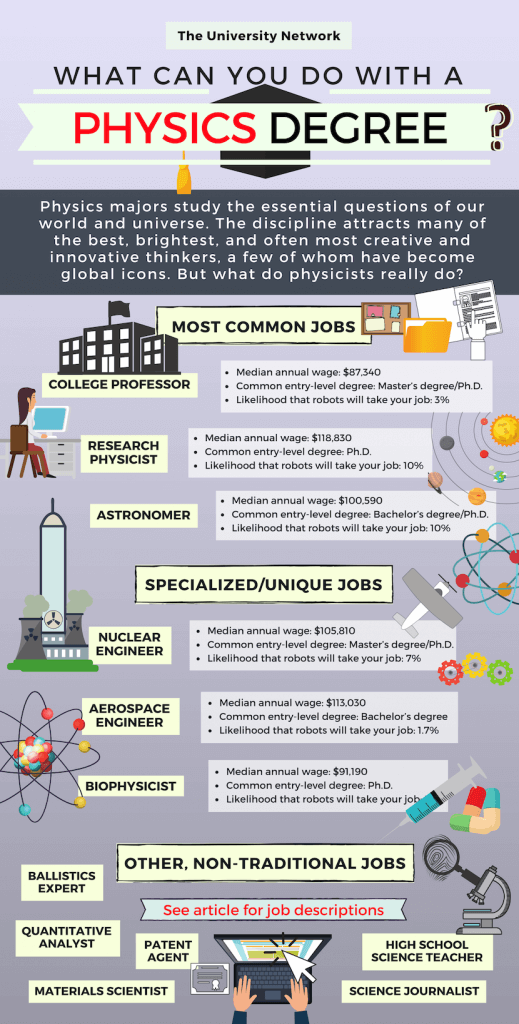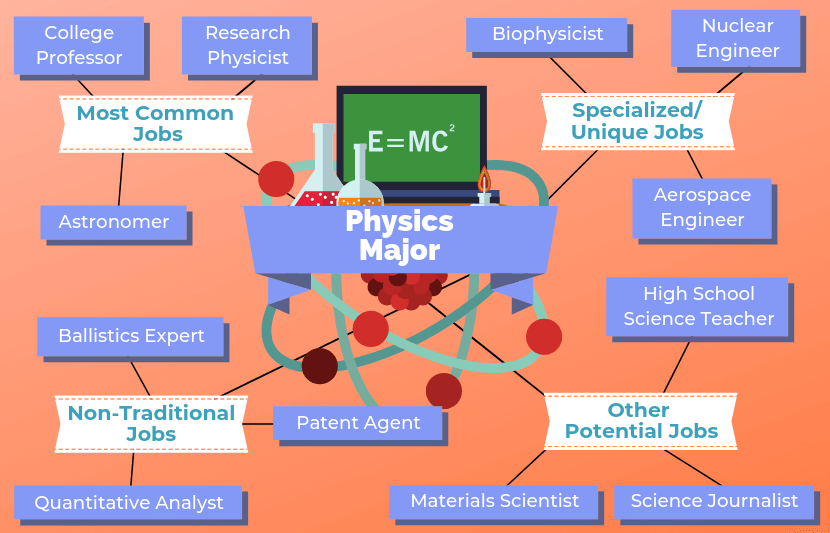Physics majors study the essential questions of our world and universe. The discipline attracts many of the best, brightest, and often most creative and innovative thinkers, a few of whom have become global icons. But what do physicists really do? They may work as university professors, researchers for the government or private organizations, engineers, financial analysts, or in countless other professions.
Here is a list of 12 possible jobs for physics majors:
Most Common Jobs for Physics Majors
1. College Professor
Many physics majors go on to become professors of their discipline. Being a college professor is a great option for physicists, as you can nurture and inspire the next generation of physicists while also conducting your own research. To earn a job teaching at the post-secondary level, you will need at least a master’s degree, but you will typically need a doctorate for a full-time tenure-track professorship.
Median annual wage: $87,340
Common entry-level degree: Master’s degree/Ph.D.
Likelihood that robots will take your job:3%
2. Research Physicist
Many private organizations employ physicists in a variety of research and research and development roles. An energy company, for example, may employ physicists to conduct research relevant to its industry and operation. You could also work in some capacity for the federal government in the Department of Energy or the Department of Defense, developing new technologies or performing basic research. Most positions require a doctorate in physics, engineering or a related field.
Median annual wage: $118,830
Common entry-level degree: Ph.D.
Likelihood that robots will take your job:10%
3. Astronomer
Astronomers spend their days researching questions about the universe — stars, planets and beyond. Their fundamental job is to observe and analyze how the universe operates in observatories or from space stations. Most astronomers are employed by universities and work as professors in addition to conducting their research, but many are also employed by the federal government in organizations like NASA or the Department of Defense. Education requirements vary depending on your employer. While teaching positions in academia typically require a doctorate, jobs in the federal government are available to those with a bachelor’s degree.
Median annual wage: $100,590
Common entry-level degree: Bachelor’s degree/Ph.D.
Likelihood that robots will take your job: 10%

Specialized/Unique Jobs for Physics Majors
4. Nuclear Engineer
Nuclear engineers are experts in the field of nuclear science who use their expertise in a variety of capacities to progress our ability to harness nuclear energy. They often work in the development of technologies that incorporate nuclear energy, which may be used in power plants or even in fields like medicine, where nuclear technologies are sometimes used to diagnose and treat disease. A bachelor’s degree in physics is typically not enough to find employment in the field. Aspiring nuclear engineers will need to demonstrate some sort of expertise in nuclear science, so it is best to pursue a master’s degree or even a doctorate in nuclear engineering or another branch of nuclear science.
Median annual wage: $105,810
Common entry-level degree: Master’s degree/Ph.D.
Likelihood that robots will take your job:7%
5. Aerospace Engineer
Aerospace engineers are scientists who spend their days developing various technologies to be used in aircraft, spacecraft, rockets, satellites and missiles. They use their knowledge of physics, advanced mathematics and computer science to design, produce and test new aerospace technologies and ensure that they meet regulatory guidelines. Typically, they specialize either in aeronautical (aircraft) engineering or astronautical (spacecraft) engineering, and may be employed by a private aerospace manufacturer or by the federal government. A bachelor’s degree is often enough to find entry-level positions in the field. Research and development positions may require a master’s degree or a doctorate.
Median annual wage: $113,030
Common entry-level degree: Bachelor’s degree
Likelihood that robots will take your job: 1.7%
6. Biophysicist
Biophysicists use the principles of biology and physics to better understand biological processes. Some may work in basic research or in applied research, developing new technologies like drugs or medications to treat diseases and infections. While some entry-level positions may be available to bachelor’s and master’s degree holders, most biophysicists work in research and development, which typically requires a doctorate. Most doctorate holders begin their careers working as postdoctoral researchers. They may move on to work as university professors or continue working in private-sector research.
Median annual wage: $91,190
Common entry-level degree: Ph.D.
Likelihood that robots will take your job: 3%
Non-Traditional Jobs for Physics Majors
7. Ballistics Expert
Ballistics experts are forensic scientists who specialize in firearms and projectiles. Like most forensic scientists, they are typically employed by police departments, or in state and federal crime labs, and assist criminal investigations by examining evidence. In any crime involving a firearm, ballistic experts are called in to collect evidence, perform gunshot residue analysis, analyze firearms evidence, identify the caliber of bullet and type of firearm, develop crime scene maps, and prepare forensic reports. Oftentimes, forensic scientists will be called into trial to testify as expert witnesses on evidence or lab technique. Becoming a ballistics expert generally requires only a bachelor’s degree in the natural sciences and experience as a forensic technician. Unlike most other forensic science specialists, ballistic experts should be particularly well-versed in physics.
Median annual wage: $57,850
Common entry-level degree: Bachelor’s degree
Likelihood that robots will take your job: 1%
8. Quantitative Analyst
Physics majors interested in working in finance might consider pursuing a career as a quantitative analyst. Quantitative analysts, or “quants,” as they are often called in the financial industry, are experts in financial securities. Quants, who are known as the rocket scientists of the financial world, are typically employed by hedge funds and investment banks, and tasked with the highly-challenging job of developing complex models and algorithms that allow companies to price and trade financial securities, using their knowledge of mathematics, computer science and finance. Because of the high level of expertise required for the position and the competitive nature of the job market, most quants have a doctorate in a quantitative field.
Median annual wage: $84,300
Common entry-level degree: Master’s degree/Ph.D.
Likelihood that robots will take your job: 23%
9. Patent Agent
Patent agents work at the intersection of science and law. These professionals assist inventors with every aspect of the patent process. This job begins with learning about the invention and its specifications, and researching similar inventions to ensure that it qualifies for a patent. Patent agents then guide their clients through the patent application process and typically complete and file the patent application. They may also act as an intermediary between the client and the U.S. Patent and Trademark Office (USPTO). To become a patent agent, you will need a bachelor’s degree in a physical science or engineering. You will also need to take and pass an exam to register with the USPTO.
Median annual wage: $96,667
Common entry-level degree: Bachelor’s degree and USPTO registration
Likelihood that robots will take your job: N/A
Other Potential Jobs for Physics Majors
10. Materials Scientist
Materials scientists use knowledge from a variety of scientific fields to study the structures and properties of various natural and synthetic materials. Oftentimes, materials scientists are employed by companies who manufacture products made from metals, ceramics, rubber, polymers or composites. Many professionals in this field will specialize in a specific type of material or production techniques. Due to the interdisciplinary nature of the field, scientists of all stripes, including physicists, work as materials scientist. Education requirements for entry into this field vary, and you will often find people of various education levels working side by side. If you have experience, a bachelor’s degree may be enough in some circumstances to find employment. Generally speaking, however, employers look for individuals with at least a master’s degree.
Median annual wage: $99,530
Common entry-level degree: Master’s degree
Likelihood that robots will take your job: 2%
11. High School Science Teacher
Being a teacher is one of the most rewarding jobs in the world and is a common path for all natural science majors. As a teacher, you can communicate and hopefully pass down your love for science to the next generation. To become a secondary school teacher, you will need to graduate with a bachelor’s degree in the subject you want to teach, while completing your school’s teacher preparation program. You’ll then need to complete a teaching internship in your subject, take and pass your state’s teaching licensure tests, and get your teaching license.
Median annual wage: $59,170
Common entry-level degree: Bachelor’s degree
Likelihood that robots will take your job:1%
12. Science Journalist
If you are interested in physics but don’t want to work in a research capacity, you might consider working as a science journalist. A physics major can prepare you well for a career as a science journalist. Science journalists may write about all branches of science for newspapers, magazines or websites. While there is no degree requirement to become a writer, a degree in physics can give you the essential knowledge to cover your subjects accurately. You may also want to take classes in English and journalism to expand your writing skills.
Median annual wage: $39,370
Common entry-level degree: Bachelor’s degree
Likelihood that robots will take your job: 11%
10 Famous People Who Studied Physics
- Oleg Deripaska, industrialist
- Stephen Hawking, theoretical physicist
- Brian May, musician
- Angela Merkel, politician
- Elon Musk, entrepreneur
- Dara Ó Briain, comedian
- Ellen Ochoa, astronaut
- J. Robert Oppenheimer, theoretical physicist
- Sally Ride, astronaut
- Carl Sagan, astronomer
To explore options for other majors, click here.



